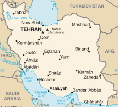Iran would be at or near the top of a list of countries Americans would least like to see have nuclear weapons, and the reasons for apprehension have deepened dramatically in the past year with the election of President Mahmoud Ahmadinejad. Iran under the mullahs since the revolution of 1979 has been a weird and ominous country. With Ahmadinejad's new prominence, the weirdness quotient has reached new levels. Iran is now headed by an individual who expresses the hope that Israel be wiped off the map and denies that the Holocaust ever occurred. Those are sentiments not found in civilized circles anywhere in the world. If one could wave a magic wand and eliminate Iran's nuclear program, all responsible governments would be grasping for that wand. Alas, in the real world such magical solutions do not exist. U.S. policymakers have only a choice among problematic options. Some choices, though, are clearly better than others. Above all, as policymakers consider the various options, they need to avoid a sense of panic. U.S. intelligence agencies have concluded that Iran will not be able to build nuclear weapons for another five to 10 years. Prominent independent experts agree with that assessment. Even the Israeli government, which has an obvious interest in presenting a worst-case scenario of the Iranian nuclear threat, concedes that Tehran will not be able to build such weapons for another three years. Based on recent information, some Bush administration policymakers now embrace a similar conclusion, although the intelligence community has not changed its official estimate. Yet even three years is a significant amount of time to craft a response.
The U.S. Should Try For a Grand Bargain With Iran

